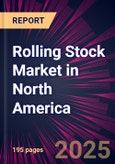Speak directly to the analyst to clarify any post sales queries you may have.
The report offers an up-to-date analysis regarding the current market scenario, the latest trends and drivers, and the overall market environment. The market is driven by increased demand for freight wagons, growing urbanization and emerging PPP model, and increasing investments in rail transportation.
The study was conducted using an objective combination of primary and secondary information including inputs from key participants in the industry. The report contains a comprehensive market size data, segment with regional analysis and vendor landscape in addition to an analysis of the key companies. Reports have historic and forecast data.
The rolling stock market in North America is segmented as below:
By Product
- Rapid transit vehicles
- Railroad cars
- Locomotives
By Type
- Rail freight
- Rail passenger
By Component
- Wheels and axles
- Suspension systems
- Braking systems
- Power and transmission systems
- Others
By Geographical Landscape
- North America
The report on the rolling stock market in North America covers the following areas:
- Rolling Stock Market in North America sizing
- Rolling Stock Market in North America forecast
- Rolling Stock Market in North America industry analysis
The report presents a detailed picture of the market by the way of study, synthesis, and summation of data from multiple sources by an analysis of key parameters such as profit, pricing, competition, and promotions. It presents various market facets by identifying the key industry influencers. The data presented is comprehensive, reliable, and a result of extensive primary and secondary research. The market research reports provide a complete competitive landscape and an in-depth vendor selection methodology and analysis using qualitative and quantitative research to forecast accurate market growth.
Table of Contents
Executive Summary
The following companies are recognized as the key players in the rolling stock market in north america: ALSTOM SA, American Industrial Transport Inc., Bombardier Inc., Brookville Equipment Corp., Caterpillar Inc., COLMAR Technik S.p.a., CRRC Corp. Ltd., FreightCar America Inc., General Electric Co., Hitachi Ltd., Hyundai Motor Co., National Steel Car Ltd., Railserve Inc., Siemens AG, Stadler Rail Ag, The Greenbrier Companies Inc., Trinity Industries Inc., United Rentals Inc., Western Train Co., and Westinghouse Air Brake Technologies Corp..Commenting on the report, an analyst from the research team said: "The latest trend gaining momentum in the market is low transportation cost of freight."
According to the report, one of the major drivers for this market is the increased demand for freight wagons.
The study was conducted using an objective combination of primary and secondary information including inputs from key participants in the industry. The report contains a comprehensive market and vendor landscape in addition to a SWOT analysis of the key vendors.
Companies Mentioned (Partial List)
A selection of companies mentioned in this report includes, but is not limited to:
- ALSTOM SA
- American Industrial Transport Inc.
- Bombardier Inc.
- Brookville Equipment Corp.
- Caterpillar Inc.
- COLMAR Technik S.p.a.
- CRRC Corp. Ltd.
- FreightCar America Inc.
- General Electric Co.
- Hitachi Ltd.
- Hyundai Motor Co.
- National Steel Car Ltd.
- Railserve Inc.
- Siemens AG
- Stadler Rail Ag
- The Greenbrier Companies Inc.
- Trinity Industries Inc.
- United Rentals Inc.
- Western Train Co.
- Westinghouse Air Brake Technologies Corp.








